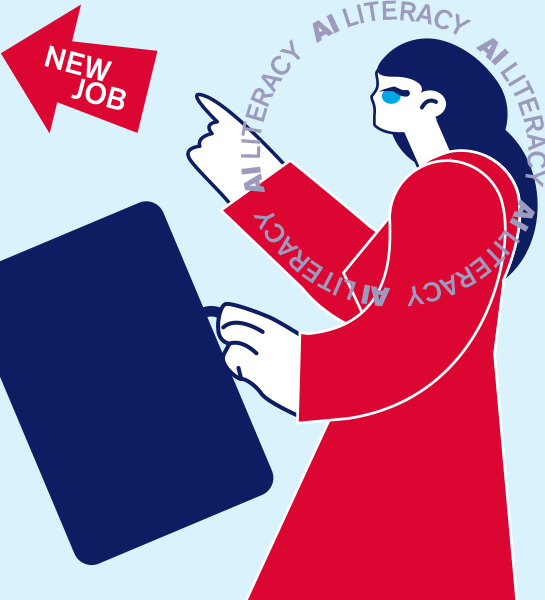Navigating the AI World: A Guide for Graduates
quote Heading link
As AI continues to evolve, those who embrace lifelong learning will be the ones who succeed.

Artificial Intelligence (AI) is everywhere! It’s in our cars, our phones, and even our homes. You might wonder how this affects you as a new graduate or an upperclassman. Well, AI can be both a challenge and an opportunity.
Companies are investing in AI to gain a competitive edge, which means they need people who understand AI. According to the World Economic Forum, AI and machine learning skills were projected to be among the world’s top 10 most in-demand skills by 20221. Fast forward to 2024, and the demand is only growing!
But it’s not just about technical skills like coding. Companies also need people who can think critically. As more tasks become automated, professionals must analyze AI algorithms, identify biases, and make decisions based on expertise. Blending analytical skills with creative thinking can lead to breakthrough strategies in AI-driven projects. For example, a retail business could use AI to optimize inventory management, but before implementing it, the company must critically evaluate the data it feeds to the AI system. They need to look at this data’s completeness, accuracy, and relevance and decide on the key factors to focus on, like demand forecasting, supply chain efficiency, and cost reduction.
But here’s the thing: many graduates feel unprepared for the AI boom. A Cengage Group report highlights that only 41% of graduates think their programs of study adequately prepared them for their first jobs, down from 63% in 20222. AI’s rapid growth has left learners feeling unprepared to enter the workforce. Employers also recognize the potential impact of AI, with 57% believing that AI could replace some entry-level jobs and teams2.
So, what can you do? Well, it’s all about adapting and learning. You must keep up with the latest AI advancements and continue developing your skills. Also, organizations need to foster a culture of continuous learning and upskilling to keep pace with AI advancements. Remember, as AI continues to evolve, those who embrace lifelong learning will be the ones who succeed. Finally, remember that AI is just a tool. Like the retail example, it takes people with the right skills and knowledge to understand both the data and the output of AI, and turn that into a meaningful return on the investment.
In short, the AI-driven future is full of challenges and opportunities. But with critical thinking, adaptability, and a commitment to learning, you’ll be well-equipped to navigate it. Good luck!
——————-
- Forbes Business Council. (2024, March 5). The future of AI skill and talent development in the workforce. Forbes. https://www.forbes.com/sites/forbesbusinesscouncil/2024/03/05/the-future-of-ai-skill-and-talent-development-in-the-workforce/?sh=699ba7f85167
- Nagel, D. (2023, August 14). Report: Graduates uncertain about workforce readiness because of AI. Campus Technology. https://campustechnology.com/articles/2023/08/14/report-graduates-uncertain-about-workforce-readiness-because-of-ai.aspx